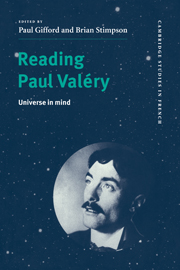Book contents
- Frontmatter
- Contents
- Contributors
- Abbreviations
- Introduction
- PART 1 SELF-SCIENCE
- PART 2 SELF-WRITINGS
- PART 3 BODY, MIND, WORLD
- 13 An aesthetics of the subject: music and the visual arts
- 14 Politics, history and the modern world
- 15 Valéry and the feminine
- 16 Dream and the unconscious
- 17 Self and other: Valéry's ‘lost object of desire’
- Conclusion
- Bibliography
- Index
- Cambridge Cultural Social Studies
15 - Valéry and the feminine
Published online by Cambridge University Press: 04 August 2010
- Frontmatter
- Contents
- Contributors
- Abbreviations
- Introduction
- PART 1 SELF-SCIENCE
- PART 2 SELF-WRITINGS
- PART 3 BODY, MIND, WORLD
- 13 An aesthetics of the subject: music and the visual arts
- 14 Politics, history and the modern world
- 15 Valéry and the feminine
- 16 Dream and the unconscious
- 17 Self and other: Valéry's ‘lost object of desire’
- Conclusion
- Bibliography
- Index
- Cambridge Cultural Social Studies
Summary
In the context of what may be termed a phenomenology of creative intelligence, desire finds its embodiment in both masculine and feminine guises. Valéry's particular conception of this distribution of roles within the authorial subjectivity – ‘Ma pensée est, je crois, … toute mâle, ma sensibilité — des féminines’ (‘My thought, I believe, is … entirely male, my sensibility — of the feminine type’) (C, xxi, p. 884) – authorises a reading which classifies the concern with control, separateness and purity, characteristic of the angelic intelligence, as ‘masculine’; while the ‘feminine’ would describe all that escapes the position of mastery, yearning rather for openness, a relaxation of anxiety concerning ego boundaries and an acceptance of fusion and flow as inevitable.
This conception of a sexual complementarity within the creative consciousness resonates with the dimension of the sacred in Western thought. Several strands in contemporary thinking posit, as a lost yet essential dimension of Western culture and symbolism, the living reality and implications of the androgyny – masculine and feminine components – of the cultural imaginary (cf. C, xiii, p. 315). Luce Irigaray evokes the copula, a renewed interaction of masculine and feminine embracing an awareness of its transcendent function, as a pre-requisite of spiritual regeneration. Jung, similarly, uses the terms ‘male’ and ‘female’ as metaphors for the conscious and unconscious aspects of psychological experience and speaks of the spiritual risk incurred by a culture that ignores the dual nature of subjectivity.
- Type
- Chapter
- Information
- Reading Paul ValéryUniverse in Mind, pp. 251 - 261Publisher: Cambridge University PressPrint publication year: 1999

